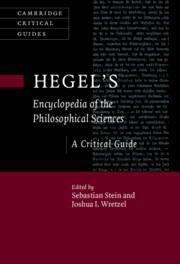Book contents
- Hegel’s Encyclopedia of the Philosophical Sciences
- Cambridge Critical Guides
- Hegel’s Encyclopedia of the Philosophical Sciences
- Copyright page
- Contents
- Contributors
- Introduction
- Chapter 1 Logical and Natural Life
- Chapter 2 Hegel’s Encyclopedia as the Science of Freedom
- Chapter 3 Essence in Hegel’s Encyclopedia and Science of Logic
- Chapter 4 The Concept’s Freedom
- Chapter 5 From Logic to Nature
- Chapter 6 Hegel’s Philosophy of Nature
- Chapter 7 Hegel’s Anthropology
- Chapter 8 Hegel’s Critique of Materialism
- Chapter 9 Hegel’s Psychology
- Chapter 10 Political Ontology and Rational Syllogistic in Hegel’s Objective Spirit
- Chapter 11 Taking the System Seriously
- Chapter 12 §§556–63: Art as a Form of Absolute Spirit
- Chapter 13 The Stubbornness of Nature in Art
- Chapter 14 The Encyclopedia’s Notion of Religion
- Chapter 15 Absolute Geist or Self-Loving God?
- Bibliography
- Index
- Cambridge Critical Guides
Chapter 8 - Hegel’s Critique of Materialism
Published online by Cambridge University Press: 07 August 2021
- Hegel’s Encyclopedia of the Philosophical Sciences
- Cambridge Critical Guides
- Hegel’s Encyclopedia of the Philosophical Sciences
- Copyright page
- Contents
- Contributors
- Introduction
- Chapter 1 Logical and Natural Life
- Chapter 2 Hegel’s Encyclopedia as the Science of Freedom
- Chapter 3 Essence in Hegel’s Encyclopedia and Science of Logic
- Chapter 4 The Concept’s Freedom
- Chapter 5 From Logic to Nature
- Chapter 6 Hegel’s Philosophy of Nature
- Chapter 7 Hegel’s Anthropology
- Chapter 8 Hegel’s Critique of Materialism
- Chapter 9 Hegel’s Psychology
- Chapter 10 Political Ontology and Rational Syllogistic in Hegel’s Objective Spirit
- Chapter 11 Taking the System Seriously
- Chapter 12 §§556–63: Art as a Form of Absolute Spirit
- Chapter 13 The Stubbornness of Nature in Art
- Chapter 14 The Encyclopedia’s Notion of Religion
- Chapter 15 Absolute Geist or Self-Loving God?
- Bibliography
- Index
- Cambridge Critical Guides
Summary
I argue that Hegel’s immaterialist metaphysics provides a viable alternative to those dissatisfied with a “disenchanted” materialism. I defend a “minimalist critique of materialism.” I show that what Hegel criticizes in materialism is not the reality of matter, but only its ultimate reality. I show that he maintains a “minimalist conception of immateriality.” I argue that he operates with a very specific notion of matter referring to mutually independent entities formed by means of external action upon them. So he is referring to entities that are not material, i.e. that are not mutually interrelated and/or are formed by means of their internal activity upon themselves. Adopting this “minimalist conception,” Hegel thinks, changes how we see the way things are. He thus starts to speak about how all things strive toward some ultimate immateriality. This is the “transformational conception of immateriality.” While this part of Hegel’s critique is problematic, I contend that Hegel’s extravagances are just his way of incorporating an expansive, “re-enchanted” conception of nature that allows material reality to exist alongside immaterial entities as Hegel conceives them.
- Type
- Chapter
- Information
- Hegel's Encyclopedia of the Philosophical SciencesA Critical Guide, pp. 148 - 165Publisher: Cambridge University PressPrint publication year: 2021
- 1
- Cited by

